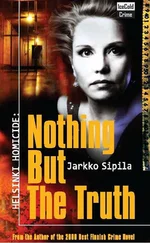Michael McGarrity - Nothing But Trouble
Здесь есть возможность читать онлайн «Michael McGarrity - Nothing But Trouble» весь текст электронной книги совершенно бесплатно (целиком полную версию без сокращений). В некоторых случаях можно слушать аудио, скачать через торрент в формате fb2 и присутствует краткое содержание. Жанр: Триллер, на английском языке. Описание произведения, (предисловие) а так же отзывы посетителей доступны на портале библиотеки ЛибКат.
- Название:Nothing But Trouble
- Автор:
- Жанр:
- Год:неизвестен
- ISBN:нет данных
- Рейтинг книги:4 / 5. Голосов: 1
-
Избранное:Добавить в избранное
- Отзывы:
-
Ваша оценка:
- 80
- 1
- 2
- 3
- 4
- 5
Nothing But Trouble: краткое содержание, описание и аннотация
Предлагаем к чтению аннотацию, описание, краткое содержание или предисловие (зависит от того, что написал сам автор книги «Nothing But Trouble»). Если вы не нашли необходимую информацию о книге — напишите в комментариях, мы постараемся отыскать её.
Nothing But Trouble — читать онлайн бесплатно полную книгу (весь текст) целиком
Ниже представлен текст книги, разбитый по страницам. Система сохранения места последней прочитанной страницы, позволяет с удобством читать онлайн бесплатно книгу «Nothing But Trouble», без необходимости каждый раз заново искать на чём Вы остановились. Поставьте закладку, и сможете в любой момент перейти на страницу, на которой закончили чтение.
Интервал:
Закладка:
He made the call, put the phone on the dashboard, and said, “It may interest you to know that Spalding paid for his passport application with a cheque from a Galway bank. Quite possibly he’s moved his assets there. I’ll query the bank in the morning. With any luck we may be able to trace his current movements through his cheque and credit-card transactions.”
Fitzmaurice stopped talking when a builder’s van rolled to a stop in front of the villa, and a stocky man with gray hair, holding a roll of blueprints, got out and waited by the side of his vehicle. He wore work boots, blue jeans, a plaid shirt, and had a bit of a potbelly. Josephine Paquette arrived shortly afterward in her hired car, accompanied by her driver. While the driver waited, Paquette talked briefly to the man at the front of the van, who quickly unrolled the blueprints on the bonnet of his vehicle and pointed to something that made Paquette nod in approval. The builder smiled, rolled up the blueprints, and followed Paquette into the house.
A half hour passed before they came out, Paquette talking and gesturing with her hands while the builder scribbled notes on a clipboard. Finally she waved a good-bye, got into the waiting car, and left.
The man walked to his van, sat in the driver’s seat with the door open, and continued to make notes.
“Here we go, then,” Fitzmaurice said as he got out of the vehicle.
Together they approached the man, who looked up from the clipboard to find Fitzmaurice’s Garda credentials under his nose.
“A few moments of your time, if you please,” Fitzmaurice said with a smile.
A brief conversation with the builder, a man named Brendan McCarrick, confirmed Sara’s theory that Spalding could not possibly have left the renovation of his villa solely in Paquette’s hands. Twice over the course of the previous week Spalding and Paquette, posing as an unmarried couple, had met McCarrick and an architect to discuss in detail the interior changes and improvements they wanted, which had to be made in accordance with the Protected Structures Act.
Once it had become clear to Spalding that McCarrick wouldn’t be able to start work on the refurbishments until the local planning council had approved the architect’s plans, Spalding had left Paquette in charge of seeing to the final details.
That afternoon McCarrick and Paquette had done a last walk-through to finalize all the construction specifications, before he sought permission from the planning council to proceed.
Without being specific Fitzmaurice advised McCarrick not to count on the project going forward. As they drove away from the disheartened builder, Sara asked Fitzmaurice about the Protected Structures Act.
“It’s a fairly new law,” Fitzmaurice replied as he pulled into the visitors’ car park at the Dun Laoghaire Marina, “that requires planning permission to make any substantial change to either the exterior or interior of buildings deemed to be worthy of architectural conservation. My semidetached suburban home, which I hope you may soon see, hardly qualifies. It is both a mercy and a pity. We can do what we like with it, but protected status does rather boost the value,” he ended with a chuckle.
They followed a pathway that skirted the marina, looking for Johnny Scanlan, the night-crew worker, and came upon him at the fuel dock, where he was topping off the tank of a sleek-looking powerboat. When he’d finished and the skipper had pulled away, Fitzmaurice approached and flashed his police credentials.
“Doherty said you’d be coming to see me,” Scanlan said, with a thick brogue that reminded Sara of the villagers she’d met on her honeymoon in Connemara.
“Have you seen this woman?” Fitzmaurice asked, holding up a photograph of Paquette.
“I have,” Scanlan replied as he put the fuel hose in the cradle. “She came looking for the Sapphire, Mr. McGuire’s boat, one evening no more than a week ago. Spent two or three hours on board before leaving. I saw her walking toward the rail station.”
“Did Mr. McGuire sleep on board his yacht during his stay?” Sara asked.
Scanlan locked the fuel hose to the pump. “Yes. I’d see him most evenings, or notice his lights on late into the night.”
“Did anyone visit him besides Paquette?”
“None that I saw.”
“Did he have any crew members?” Fitzmaurice asked.
Scanlan shook his head. “With a boat like that you don’t need a crew.” “Did he say where he was sailing?”
“No, but the way he provisioned his boat before he left, I’d say he was planning a long cruise.” Scanlan eyed the fuel-pump gauge and recorded the amount of petrol he’d delivered to the speedboat. “Is that it, then? I’ve got work to do.”
“Thank you,” Sara said.
On the way to the car Fitzmaurice’s phone rang, and after a brief exchange with the caller he told Sara the owner of Celtic Sailing would meet them at his pierside business establishment in fifteen minutes. The phone rang immediately again and Fitzmaurice broke into a smile when he took the call.
“Just a minute, luv,” he said, winking at Sara, “let me ask her. My wife wants to know if you’re still beguiling me.”
Sara smiled. “Tell her I am doing no such thing.”
“The good colonel refuses to take any responsibility for her flirtatious ways,” he said with a twinkle in his eye. He paused to listen and then turned to Sara. “Would you be up to having a late meal with us?”
“That would be lovely,” Sara replied.
Fitzmaurice glanced at his wristwatch. “Give us two hours, luv,” he said to his wife before disconnecting.
At the Bray pier Desmond Phelan, the owner of Celtic Sailing, waited for them under the shop’s Boats for Hire sign. In his thirties, Phelan was a small-boned man with light-brown hair, a wide forehead, and an aquiline nose. Inside the shop two young boys, no more than four and six years old, sat on stools at a customer-service counter, drawing pictures on scraps of paper.
Phelan told the boys to stay put and led Fitzmaurice and Sara to a small back room that served as both office and a storage room. He nodded at the photograph Fitzmaurice placed before him on his cluttered desktop.
“George McGuire,” Phelan said. “A genial fellow, quite the eager student. I couldn’t imagine why a Garda would come to my house at suppertime to ask me to talk to you. I surely didn’t think it had anything to do with Mr. McGuire.”
“We need to locate Mr. McGuire,” Sara said, “to inform him of a family emergency. Do you know where he might be?”
“On the water this fine evening in a smooth sea. You should be able to reach him by marine radio.”
“When did you last see him?”
“He sailed this morning.”
“Going where?” Sara asked.
“He didn’t say. He came down from Dun Laoghaire five days ago and retained me to tutor him on celestial navigation techniques so he could prepare for his yachtmaster ocean certification, which requires making a passage without the use of electronic aids. He did the shore-based class-work in the mornings and then we went out later in the day for his practice exercises.”
“Was he planning to do his qualifying trip for his certification right away?” Sara asked.
Phelan perched on the corner of the desk. “He said nothing to me about it.”
“How did he pay for your services?” Sara asked.
“By credit card.”
“Could we see the charge slip?”
“Of course.”
Sara stood on the Bray pier looking out at the horseshoe bay while Fitzmaurice made phone calls on his mobile to learn if the writ had been approved to access Paquette’s Internet account, and to arrange for a detective to speak to the solicitor who’d prepared the conveyancing documents for the sale of the villa. A paved promenade ran along the shoreline just behind a rock barrier where waves lapped at a slender ribbon of beach. A hilly spit of land rose up at one end of the bay, and the quiet sea, as pale gray as the evening sky, seemed to absorb the fading light.
Читать дальшеИнтервал:
Закладка:
Похожие книги на «Nothing But Trouble»
Представляем Вашему вниманию похожие книги на «Nothing But Trouble» списком для выбора. Мы отобрали схожую по названию и смыслу литературу в надежде предоставить читателям больше вариантов отыскать новые, интересные, ещё непрочитанные произведения.
Обсуждение, отзывы о книге «Nothing But Trouble» и просто собственные мнения читателей. Оставьте ваши комментарии, напишите, что Вы думаете о произведении, его смысле или главных героях. Укажите что конкретно понравилось, а что нет, и почему Вы так считаете.












